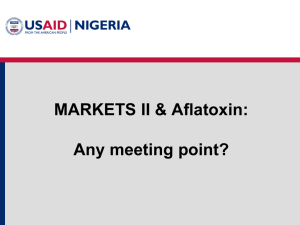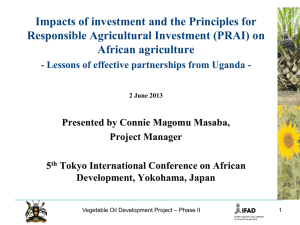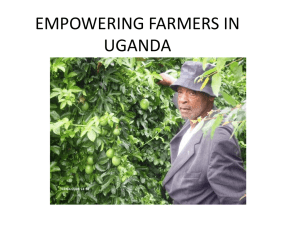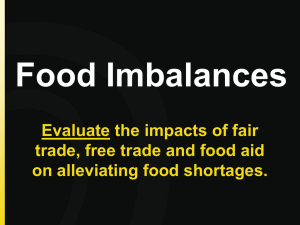Millstones Farm Project Partner Brief 10th april 2015
advertisement
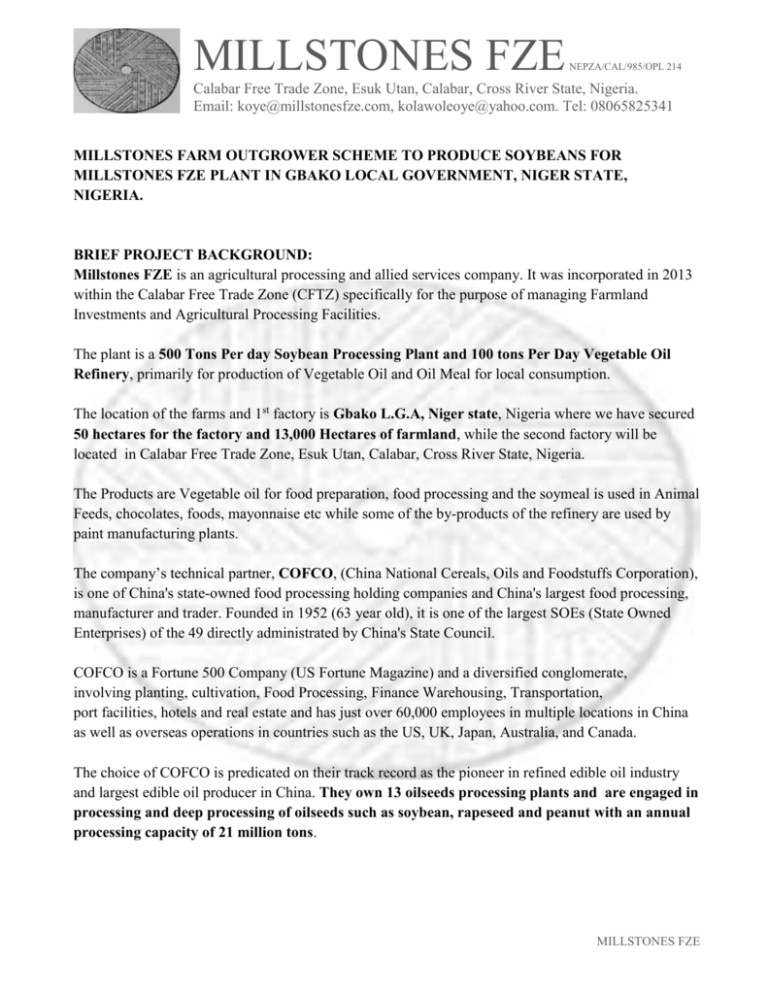
MILLSTONES FZE NEPZA/CAL/985/OPL 214 Calabar Free Trade Zone, Esuk Utan, Calabar, Cross River State, Nigeria. Email: koye@millstonesfze.com, kolawoleoye@yahoo.com. Tel: 08065825341 MILLSTONES FARM OUTGROWER SCHEME TO PRODUCE SOYBEANS FOR MILLSTONES FZE PLANT IN GBAKO LOCAL GOVERNMENT, NIGER STATE, NIGERIA. BRIEF PROJECT BACKGROUND: Millstones FZE is an agricultural processing and allied services company. It was incorporated in 2013 within the Calabar Free Trade Zone (CFTZ) specifically for the purpose of managing Farmland Investments and Agricultural Processing Facilities. The plant is a 500 Tons Per day Soybean Processing Plant and 100 tons Per Day Vegetable Oil Refinery, primarily for production of Vegetable Oil and Oil Meal for local consumption. The location of the farms and 1st factory is Gbako L.G.A, Niger state, Nigeria where we have secured 50 hectares for the factory and 13,000 Hectares of farmland, while the second factory will be located in Calabar Free Trade Zone, Esuk Utan, Calabar, Cross River State, Nigeria. The Products are Vegetable oil for food preparation, food processing and the soymeal is used in Animal Feeds, chocolates, foods, mayonnaise etc while some of the by-products of the refinery are used by paint manufacturing plants. The company’s technical partner, COFCO, (China National Cereals, Oils and Foodstuffs Corporation), is one of China's state-owned food processing holding companies and China's largest food processing, manufacturer and trader. Founded in 1952 (63 year old), it is one of the largest SOEs (State Owned Enterprises) of the 49 directly administrated by China's State Council. COFCO is a Fortune 500 Company (US Fortune Magazine) and a diversified conglomerate, involving planting, cultivation, Food Processing, Finance Warehousing, Transportation, port facilities, hotels and real estate and has just over 60,000 employees in multiple locations in China as well as overseas operations in countries such as the US, UK, Japan, Australia, and Canada. The choice of COFCO is predicated on their track record as the pioneer in refined edible oil industry and largest edible oil producer in China. They own 13 oilseeds processing plants and are engaged in processing and deep processing of oilseeds such as soybean, rapeseed and peanut with an annual processing capacity of 21 million tons. MILLSTONES FZE VEGETABLE OIL INDUSTRY 1. Nigeria consumes over 1 Million MT of vegetable oil per annum & a 300,000 tonnes demand-supply gap exists in the Nigerian vegetable oil market - (USDA/ MAN) 2. “The Minister of Industry, Trade and Investment, Mr. Olusegun Aganga, disclosed during the opening ceremony of the ministerial session of the National Council on Industry, Trade and Investment, in April 2013 in Ibadan, "Specifically, for vegetable oil production, import fell from about N1 trillion to about N577billion;" Hence a N577billion demand deficit in the market yearly still exists, which is made up with Imported vegetable oil. 3. 2012 data indicates that 70 percent of the Vegetable Oil Imports into West African Countries are into Benin and Nigeria (470,000 MT and 450,000 MT respectively). Sources claim that maximum of the import into Benin is routed into Nigeria. 2012 consumption numbers confirms same as Benin exports close to 390,000 MT of palm oil. Index mundi 2012 report on Fats and Oil and Vegetable Oil industry. 4. The Market for Vegetable Oil is ever booming because it is an essential commodity consumed by both the rich and poor. Industry data suggests that Nigerian consumers use more than one million (1,000,000) metric tonnes of vegetable oil per annum. The demand is thus high but local supply is low. A 300,000 tonnes demand-supply gap exists in the Nigerian vegetable oil market – MAN (Manufacturers Association of Nigeria) 2013/USDA 2013. 5. Nigeria is the 26th largest economy in the world and the largest economy in Africa, with a GDP $509.9 billion (N80.2 trillion) and has maintained its impressive growth over the past decade with a record estimated 7.4% growth of real gross domestic product (GDP) in 2013, up from 6.7% in 2012. This growth rate is higher than the West African subregional level and far higher than the sub-Saharan Africa level. National Bureau of Statistics (NBS)/ World Bank (IBRD)/ African Development Bank (ADB). 6. Global demand for vegetable oils for food and biofuel use is expected to increase by an additional 23million tons by 2016; however supply is expected to struggle to keep up with the demand”- Rabobank, (No. 1 bank in the Netherlands and the world’s leading food & agribusiness bank). 7. Nigeria presently produces about 550,000MT (2012) & 650,000MT (2013) of Soybean annually making it the largest producer of the product on the African continent. 8. Nigeria’s current demand for Soybeans now stands at N300Billion annually ( Community of Agricultural Stakeholders of Nigeria (CASON) 5th January 2015). 9. Nigerian soybean crushers are operating at 60 percent below capacity & are also unable to satisfy the growing demand for soybean meal and oil. (Agrochart Report June 2014). MILLSTONES FZE BUSINESS OVERVIEW The plant is an end to end factory with zero wastes, and soybeans processed products have 365 applications. The primary products of the plant are: - Soybean Vegetable Oil which forms 50% of all known edible oils in the world markets, while Soymeal is used in animal feeds, chocolates, foods etc. The Soy Flour is used in baking, Baby foods, Instant meals and a number of flour mills blend it with wheat flour to increase the protein content etc and some of the bye-products of the refinery are used by paint manufacturing plants. PLANT PRODUCTION The 500 tons per day Soybean Processing Plant and 100 Tons per day refinery will produce:1. 100 tons (107,991.3 Litres) of Vegetable Oil daily. 2. 400 tons (400,000 Kg) of Soybean Meal daily. 3. Soy flour production is variable (from further processing and milling of soy meal). IMPACT ASSESSMENT OF THE FARMING PROJECT AND PLANT CREATE WEALTH The factory will require between 90,000 - 180,000 tons of soybeans per year. Thereby contributing to incomes of 100,000-180,000 farmers yearly. CREATE EMPLOYMENT The factory will employ 160 Factory staff, 1000 Local buying agent/farmers & create at least 10,000 additional jobs in Sales, Logistics, Warehousing etc FOOD SECURITY The 500TPD Processing Plant and 100 TPD refinery will produce daily:A. 100 tons (107,991.3 Litres) of Vegetable Oil daily. B. 400 tons (400,000Kg) of Soymeal daily (8,000 nos 50kg bags daily). INCREASE PRODUCTION Nigeria produced 550,000MT of Soybeans in 2012 and 650,000MT in 2013. The Factory will require an additional 180,000 tons. HEALTH We will be producing good quality, health and nutritious products, thereby reducing dependence of adulterated vegetable oil and ensuring good quality products are consumed by Nigerians. VALUE ADDED Soybean prices fluctuate between N45,000 (pre harvest) - N77,000 per ton at harvest season and resold between N90,000 - N140,000 by merchants, but the farmers do the most work and get the least income DIVERSIVICATION OF ECONOMY This project is in line with the FGN’s plan to diversify the economy and grow the real sector (improving local manufacturing and industries). MILLSTONES FZE PROPOSED WORK PLAN All communities within and around the 13,000 hectares farmland in Niger State have indicated willingness to participate. The Communities include: 1. 3. 5. 7. 9. 11. 13. 15. 17. 19. 21. 23. 25. Nnawoyegi Ajakpya Kalach Ndagi Tifin Kuyizhi Tako Batako Kupa Zannagi Ladigi Tsadu Kashi Kawo Yazhigi Tswachi Danchitako 2. 4. 6. 8. 10. 12. 14. 16. 18. 20. 22. 24. Goyi Dangi Chakya Toba Tswatagi Ndaji Tako Kuyizhi Tifin Mangevula Daku/Ndawuya Kantigi Patigi Manzenu Kuyizhi Yazhigi Ekpan There are additional communities within Niger State outside the 13,000 hectares area and outside Gbako L.G.A, who have also indicated interest in participating, hence if the partners can manage larger numbers, they can be co-opted into the scheme. I. II. III. IV. V. VI. Identification of participating farmers shall be by filling the intent form of the Partner(s)/Millstones. Allocation of minimum Four (4) hectare land to each participant within the surveyed area. After allocation, each participating farmer(s) shall identify his or her farm. Between 2000 (Two thousand) to 5000 (Five thousand) farmers are expected to participate in the scheme. Forms shall be made available for participating farmers. Farmers are being assisted with Training and Inputs/Inputs Support/Input Finance. SUPPORT FOR FARMERS (MANAGEMENT AND TRAINING, PROVISION OF INPUTS/INPUT SUPPORT AND INPUT FINANCING: We have looked different models of input support/input financing, 1. Model 1:- Provision of Inputs at subsidized rate 2. Model 2:- Provision of Inputs via input financing to the farmers, where payback will be from sale of crops to Millstones FZE. 3. Model 3:- Provision of some inputs and support as a grant or gift ( we do not support cash given in lieu of actual input). MILLSTONES FZE Millstones FZE will guarantee purchase of all Soybeans from the farmers and is willing to enter into agreements to do same with Partners and will support payment schemes from Millstones to partners, at point of receipt of soybeans from farmers or as mutually agreed by both parties. INPUTS REQUIRED 1. Support towards land clearing and preparation. 2. Training of Farmers of Proper Planting, Fertilizer Application, Integrated Soil Management, Inoculant Application etc. This Will be provided by our Partners ( IITA, N2AFRICA, Notore, IFDC 2SCALE etc). 3. Viable seeds (IITA/N2Africa High Yield Varieties (TGX 536-02D, Samsoy 2) 50kg per hectare. 4. Tractors for hiring (at least 5 tractors) will be available for hiring, from a third party or via lease. 5. Farm Chemicals i.e Herbicides and Pesticides (Apron plus (seed preparation), Galex or Dual (34 litres per hectare, just after planting), Fusilade or Scepter ( 3-4 litres per hectare 3 weeks after planting), For areas with possible or existing insect invasion apply *Sherpa plus, karate, thiodian etc). 6. Knapsack Sprayer. 7. Fertilizers i.e NPK 20-10-10 or NPK 15-15-15 (50kg per hectare) and Super Phosphate (200kg per hectare). 8. Rhizobium Inoculant 9. NAIC Insurance for participating farmers. @ 1.5% of total inputs. 10. Threshers, Harvester or Combine Harvester. BUDGET OPTIONS:A. BUDGET FOR 4 HECTARES (Prepared by Specialist using IITA Best Practice) 1. Support towards land clearing and preparation. N28,000 to be born by farmer. 2. Training of Farmers by our Partners. At no additional Cost 3. Seeds (IITA/N2Africa High Yield Varieties) @50kg/ha (X N200/kg) 200Kg =N40,000. 1. Tractor lease for 1 day N38,000 ( Tractor Lease, Operator Fees, Diesel etc) 2. Farm Chemicals i.e Herbicides and Pesticides @ 4lt/ha (X N800) = N16,000. 3. Knapsack Sprayer for 4 Ha N1500. 4. Fertilizers Super Phosphate @200kg/ha (N4,500/50kg) = N90,000 5. Rhizobium Inoculant @ $20/ha X 4Ha (@ N210:1USD) = N16,800 Sub Total= N202,300 6. NAIC Insurance for participating farmers. @ 1.5%= N3,034.5 Total cost N205,334.50(Excluding Land Clearing, Harvesting & Threshing borne by farmer). 7. Harvesting and Threshing of crops. To be borne by farmer. B. 1. 2. 3. POSSIBLE BUDGET FOR 4 HECTARES (Prepared by Farmers Co-operative) Support towards land clearing and preparation. N28,000 to be borne by farmer Training of Farmers and management. At no additional Cost Viable seeds (IITA/N2Africa High Yield Varieties 100kg for 4 hectares @ N10,000) MILLSTONES FZE 4. 5. 6. 7. 8. Tractor lease for 1 day N20,000. Farm Chemicals i.e Herbicides and Pesticides 16L herbicides N800 per Litre = N12,800. Knapsack Sprayer for 4 Ha N1500. Fertilizers Super Phosphate 4 bags of super phosphate @N5,000 each = N20,0000. Fertilizers 8 bags of NPK@ N5,500 each =N44,000 Sub Total= N108,300 9. NAIC Insurance for participating farmers. @ 1.5%= N1,624.5 Total N109,924.50 (Excluding Land Clearing, Harvesting & Threshing borne by farmer). 10. Harvesting and Threshing of crops: To be borne by farmer. RECOMMENDATION 1. Appointment of farm manager(s), stating the nature of appointment, logistics per month and end of the harvest benefit. 2. Two supporting staff and a community supplier suggested 3. Motorcycles for easy transport or movement within and around the farm. 4. Temporary office accommodation and store for farm input. 5. Standard measuring scale. 6. Manual measures. 7. Record books for each community. TIME SCHEDULE FOR WORK PLAN 1. Visit to Emir, Kusodu Nupe and Hakimi Batagi to intimate them on the plan 2. Printing of intent form, file jackets etc. 9th-10th of April 2015. 3. Survey demarcation of farm into Four (4) hectares farms, allocation of farm site and land preparation. Date:- 13th to 17th April 2015 4. We can organize a 1 or 2 day(s) sensitization workshop for representatives of participating communities and commence mobilization and registration of up to 5000 participants that will be clustered into famer groups/co-operatives groups of 20 (or as defined by partner(s). Proposed date:- 15th & 17th of April 2015. 5. Allocate 4 hectares farm plots to farmers. Proposed date:- 17th to 30th April 2015. 6. Submission of intent form. Proposed date:- 15th-30th of April. 7. Land clearing by farmers. Proposed date:- 20th April-5th of June 2015 8. Begin training and Farming operation and input support Proposed date:- 8th May 2015- 30th June 2015. Expected Revenue for farmers: 1. Yield @ 1500kg/ha (conservative) = 6,000kg ( yields maybe between 1.5 – 2.5Tons/Ha) 2. Revenues @ N77,000 per 1000kg, hence 6,000kg = N 462,000 3. Gross Profit = N462,000- N205,334.50 = N256,666 MILLSTONES FZE
